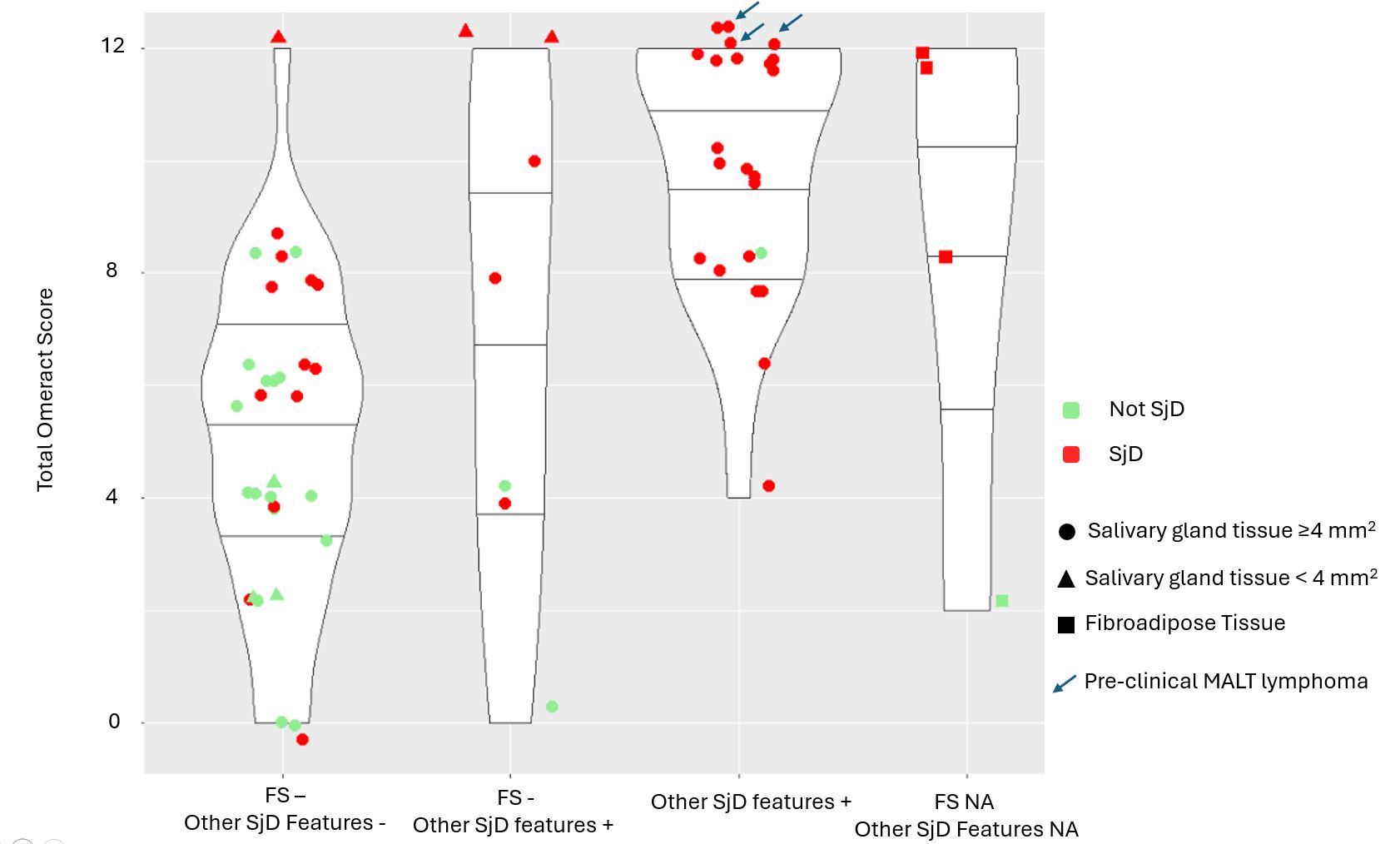Session Information
Session Type: Poster Session B
Session Time: 10:30AM-12:30PM
Background/Purpose: Histopathology remains a cornerstone in the diagnostic workup of Sjögren’s disease (SjD). Ultrasound (US)-guided core needle biopsy (CNB) of the parotid gland has emerged as a valuable alternative for obtaining salivary gland tissue for diagnostic purposes. This study aimed to assess the feasibility and tolerance of US guided CNB in a large cohort of suspected and confirmed SjD patients without salivary gland swelling, and to explore its role in SjD diagnosis and patient stratification.
Methods: 66 patients from the Belgian Sjögren’s Syndrome Transition Trial (BeSSTT) without salivary gland swelling underwent US guided CNB of the parotid gland. US was evaluated by Omeract and Hocevar scores. FS was calculated. Immunohistochemistry was performed (anti-CD20, anti-CD3, anti-CD138, anti-CD21, anti-Bcl-6, anti-CK, anti-FcRL4).
Results: First, CNB was well-tolerated and patients were willing to repeat the procedure. Second, CNB reliably provided sufficient salivary gland tissue to calculate FS in most cases (56/66). Even when too little salivary gland tissue was obtained (6/66), other SjD related parameters (Follicular dendritic cells, B cell predominance, increase in plasma cells, Lymphoepithelial lesions) allowed for biopsy evaluation. Third, US was significantly associated with both FS and the other SjD related features. A Hocevar score of less than 20 consistently indicated negative biopsy results. Remarkably, SjD patients showed a wide variety of histological findings, ranging from mild to severe parotid gland involvement, despite having similar clinical characteristics. Pre-clinical MALT lymphoma was observed in three cases, all with maximum US scores.
Conclusion: US guided CNB is well-tolerated and feasible, enhancing its utility in diagnosing SjD and stratifying patients. CNB facilitates the identification of homogeneous patient cohorts and offers a feasible endpoint for clinical trials. Furthermore, it serves as a minimally burdensome method to detect pre-clinical MALT lymphoma within the window of opportunity for immune intervention.
To cite this abstract in AMA style:
Achten H, Genbrugge E, Creytens D, Vanhaecke A, De Boeck K, Elewaut D, Peene I. Ultrasound (US)-guided Core-needle Biopsy (CNB) of the Non-swollen Parotid Gland: A Feasible and Well-tolerated Technique for Diagnosing and Stratifying Sjögren’s Disease (SjD) [abstract]. Arthritis Rheumatol. 2024; 76 (suppl 9). https://acrabstracts.org/abstract/ultrasound-us-guided-core-needle-biopsy-cnb-of-the-non-swollen-parotid-gland-a-feasible-and-well-tolerated-technique-for-diagnosing-and-stratifying-sjogrens-disease-sjd/. Accessed .« Back to ACR Convergence 2024
ACR Meeting Abstracts - https://acrabstracts.org/abstract/ultrasound-us-guided-core-needle-biopsy-cnb-of-the-non-swollen-parotid-gland-a-feasible-and-well-tolerated-technique-for-diagnosing-and-stratifying-sjogrens-disease-sjd/

